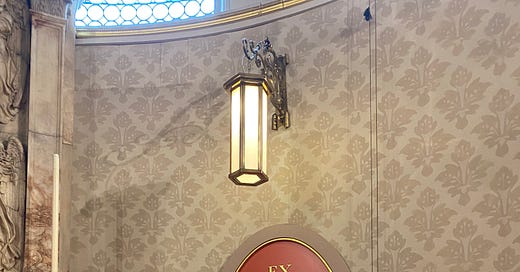You have received this newsletter because you’re likely the kind of person who believes deeply in the power of art and beauty to change the world. Which is the mission of The Comic Muse.
The photograph above is of a medallion featuring Cardinal Newman’s motto—”From shadows and images to the truth”—located in the Newman Chapel in the Birmingham Oratory, Birmingham, England. The motto is a perfect description of poetic experience.
The other day I asked on Substack Notes:
How does personal transformation work? What moves you to grow into a better version of yourself?
We can push the question further:
How can we bring about the cultural change we long to see? How are renewal and renaissance possible?
I think we all have an inkling as to the answer.
Real growth requires a change of heart.
And how is the heart changed?
Cardinal Newman offers a wonderful explanation:
“The heart is commonly reached, not through reason, but through the imagination, by means of direct impressions, by the testimony of facts and events, by history, by description. Persons influence us, voices melt us, looks subdue us, deeds inflame us. Many a man will love and die upon a dogma: no man will be a martyr for a conclusion….No one, I say, will die for his own calculations: he dies for realities.”
What Newman is talking about here is what I like to call “poetic experience.”
Poetic experience might involve poetry, and we often associate it with poetry and poets. But it’s not just about poetry.
Rather, poetic experience is an encounter with some beautiful aspect of the world that enraptures our entire self—or the core of our entire self, what we often refer to as “the heart.”
The encounter I am calling poetic experience is not a warm, fuzzy feeling. It is actually knowledge, and in fact the most important kind of knowledge.
Pope Benedict XVI picks up on this theme in a message he delivered in August 2002 entitled, “The Feeling of Things, the Contemplation of Beauty.” His focus, naturally, is on the poetic experience of an encounter with Christ, but he also has a lot to say about the encounter of artistic beauty as a witness to the divine. He writes:
“Being struck and overcome by the beauty of Christ is a more real, more profound knowledge than mere rational deduction. Of course we must not underrate the importance of theological reflection, of exact and precise theological thought; it remains absolutely necessary. But to move from here to disdain or to reject the impact produced by the response of the heart in the encounter with beauty as a true form of knowledge would impoverish us and dry up our faith and our theology. We must rediscover this form of knowledge; it is a pressing need of our time.”
A pressing need of our time.
The need, that is, to acknowledge a kind of knowing higher (“more real, more profound”) than analytical thinking, rational deduction, and utilitarian-technologized reasoning.
This kind of knowing is poetic experience.
It is a knowing that moves the heart—shakes us at the core of our being by the beauty of the real—and moves us to change…
and to change the world.
Poet Dana Gioia, in his essay, “The Catholic Writer Today,” puts the thought in the context of the Catholic writer of literature:
“The Catholic writer understands the necessary relationship between truth and beauty, which is not mere social convention or cultural accident but an essential form of human knowledge—intuitive, holistic, and experiential. Art is a form of knowing—distinct and legitimate—rooted in feeling and delight—that discovers, in the words of Jacques Maritain, ‘The splendor of the secrets of being radiating into intelligence.’”
Because this kind of knowing is so neglected by our culture, I will soon be offering a new short audio course on poetic experience, how it relates to personal transformation, including its intriguing connection to the making and enjoyment of art.
If you’re interested in being put on my list of those interested in being alerted when the course drops, please let me know in the comments below.





Please put me on the list!
Thank you for this reflection --a heartening reminder.
Definitely interested in the course.